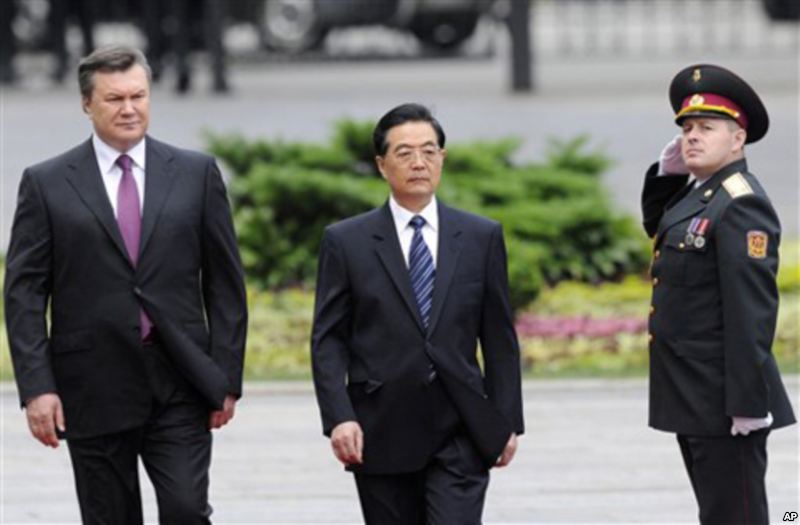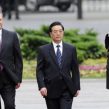
Ukraine Increasingly Relies on Chinese Finances
Publication: Eurasia Daily Monitor Volume: 9 Issue: 144
By:

China has preliminarily agreed to lend more than $7 billion to Ukraine. In addition, an agreement has been signed between the two countries’ central banks on a currency swap worth $2.4 billion. Although it is likely to take months of talks to agree on the details of the projects to be financed by China, this can be roughly compared in scale to the volume of loans that Ukraine received from international financial institutions in 2008-2010, which helped the country survive the crisis (see below). Beijing will benefit from further internationalizing its currency and increasing exports to Ukraine. Kyiv, on the other hand, expects to be able to save its reserves, which have been shrinking as the International Monetary Fund (IMF) froze assistance last year, improve its balance of payments, as well as receive additional leverage in its ongoing gas dispute with Russia since some of the projects Ukraine has discussed with China are aimed to cut gas imports.
While the West has been getting increasingly reluctant to lend to Ukraine’s weakening economy – both due to its own financial problems and the slow reforms and problems with democracy in Ukraine – Kyiv has indicated that it will look for funds elsewhere. Last fall, Deputy Prime Minister Serhy Tyhypko said on national television that if Ukraine failed to come to terms with the IMF, it would seek loans from the BRIC countries (Brazil, Russia, India and China) (UT1, November 24). Ukrainian Foreign Minister Kostyantyn Hryshchenko, in an article published last spring, praised China as “a quiet, non-interventionist” power, called for “making up for leeway” regarding the country, and even suggested that Ukraine could become an “investment El Dorado” for China (Zerkalo Nedeli, March 9).
After virtually ignoring China’s economic potential for many years, Ukraine proclaimed China one of its economic priorities in the wake of Viktor Yanukovych’s election as president in early 2010. Yanukovych promised a deluge of investment from China when he visited Beijing in September 2010. Later, Chinese President Hu Jintao came to Ukraine in June 2011 to spend time in Yanukovych’s company in Crimea and sign a number of documents (see EDM, June 22, 2011). Chinese money did not start to come to Ukraine until this summer as it took the two countries’ bureaucracies much time to finalize details of cooperation.
Ukraine received the first loan under the Yanukovych-Hu agreements this past June, when China Development Bank issued the first tranche of an $85 million loan to upgrade a coal mine in Luhansk Region (RIA, July 13). All in all, Ukraine hopes to receive some $1 billion in loans for its coal mines from China. Also in June, the National Bank of Ukraine signed a $2.4 billion currency swap deal with China’s central bank for three years (bank.gov.ua, June 26). The deal should allow Ukraine to spend less from its currency reserves on imports from China, with which Ukraine runs a chronic trade deficit. China has signed similar agreements with several countries thus far, including such important players as Japan, Brazil and Turkey in an effort to internationalize its currency, the yuan.
On June 28, Ukraine’s Agriculture Ministry and China’s Eximbank preliminarily agreed that China would lend up to $3 billion for agricultural projects in Ukraine for 15 years at 6 percent interest. Under the agreement, Ukraine will boost agricultural commodity exports to China, while using Chinese money to buy pesticides and equipment from the Asian country. Ukraine’s parliament promptly passed a bill to allow the government to accept the loan (Interfax-Ukraine, July 2; rada.gov.ua, July 4).
On July 13, the Ukrainian Energy and Coal Ministry and the China Development Bank signed an agreement according to which China will issue loans totaling almost $3.7 billion to finance a transition from expensive Russian gas to coal at Ukraine’s municipal heating plants and for building a coal gasification plant. The Ukrainian government hopes that if the projects are implemented, Ukraine will be able to cut Russian natural gas imports by 11-12 billion cubic meters (bcm) per annum. This is very important for Ukraine, which has set out to cut its import of Gazprom’s gas from 40 bcm last year down to no more than 27 bcm this year, in line with its stated strategy to escape Ukrainian dependence on Russian gas by 2025-2030. Kyiv is sure to use the agreement with China as a bargaining chip in its ongoing gas talks with Moscow (see EDM, July 10).
Also this July, the Chinese government ratified a $372 million 15-year loan for a railroad link from Kyiv to the international airport in Boryspil. Ukraine expects the first $15 million tranche by early August (Kommersant-Ukraine, July 16). China will export its technologies under the deal. Those may be inferior in quality to Western technologies, but it would have been very difficult for Ukraine to find domestic sources to finance this infrastructural project. Ukraine already spent billions of dollars on preparing its infrastructure for the Euro-2012 soccer championship, which it co-hosted with Poland early this summer.
High-level exchanges and increasing economic relations are not set to plateau yet. Last week, Foreign Minister Hryshchenko spent several days in China preparing Yanukovych’s upcoming visit there (UNIAN, July 18, 21). Indeed, this may become a breakthrough year for Kyiv’s relations with Beijing. And as Ukraine continues to seek alternatives to Russian economic coercion and dwindling Western assistance, Chinese loans and joint projects could serve as an important lifeline for the Ukrainian economy.




